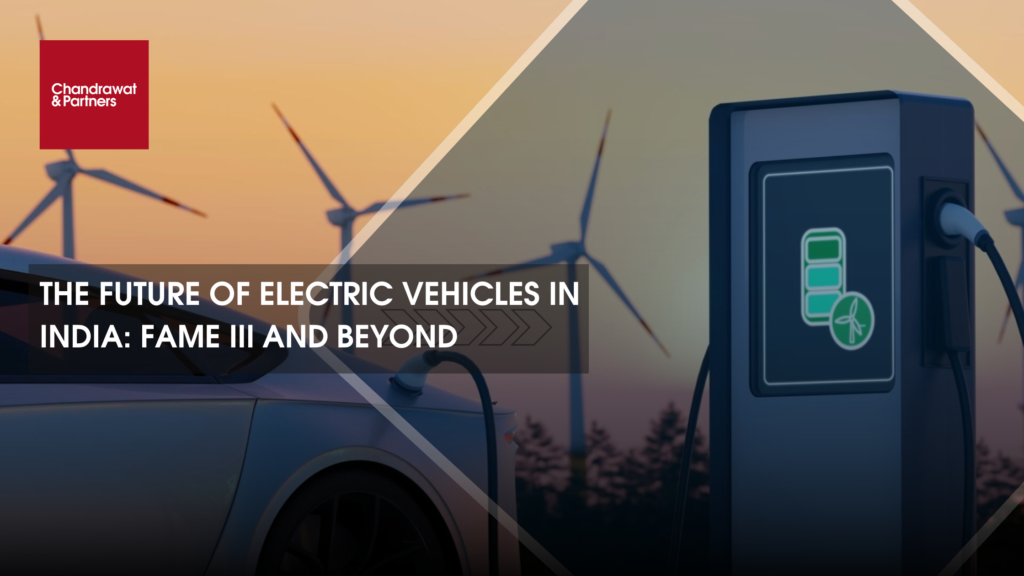
THE FUTURE OF ELECTRIC VEHICLES IN INDIA: FAME III AND BEYOND
India’s ambitious target of making 30% of all vehicles sales electric by 2030 is backed by the Faster Adoption and Manufacturing of Hybrid and Electronic Vehicles (“FAME III”) scheme which is expected to play a pivotal role in shaping the future of transportation in India. It is aimed at increasing subsidies for EV buyers, encourage companies to set up battery manufacturing plants in India, invest in research and development for batter technology, and promote the use of EV commercial vehicles. Additionally, a comprehensive Battery Swapping policy is on the horizon, which will further bolster the government’s Make in India initiative.
ENCOURAGING DOMESTIC BATTERY MANUFACTURING
One of the key components of FAME III is the encouragement of domestic battery manufacturing. By incentivizing companies to set up battery plants in India, the government aims to reduce dependency on imports, lower the cost of EVs, and create job opportunity. This initiative is not only aligned with the Make in India program but also crucial for establishing a sustainable and self-reliant EV ecosystem. Research and development in battery technology will be a focal point under FAME III. Improved battery technology can lead to longer-lasting, more efficient, and cost-effective batteries. This will directly impact the overall performance and affordability of electric vehicles, making them a more viable option for consumers and businesses alike. The introduction of a comprehensive Battery Swapping policy which allows EV users to quickly exchange depleted batteries for fully charged ones at designated swapping stations, addressing concerns about long charging times and the availability of charging infrastructure.
GST RESTRUCTURING AND ALTERNATIVE FUELS
In addition to FAME III, there is also potential for restructuring the Goods and Services Tax (GST) for hybrid vehicles, which is currently taxed at 43% in contrast to 48% tax on petrol and diesel vehicles. Moreover, changes in policy for alternative fuels like biofuels and CNG are anticipated which can serve as an intermediate solution, reducing the carbon footprint of the transportation sector while the infrastructure for electric vehicles continues to develop.
CUSTOM DUTY REDUCTIONS TO BOOST EV AFFORDABILITY
The Indian government has announced a significant reduction in custom duties on EV components the reduction in custom duties on EV components will not only benefit manufacturers by lowering production costs but will also result in more affordable EVs for consumers. One of the key developments in the budget is the total exemption in custom duties on lithium, copper and other rare earth elements. This measure is expected to alleviate some of the financial burden on manufacturers, as it will decrease the overall cost of producing EVs by lowering the cost of lithium-ion battery manufacture. The lower production costs are anticipated to be passed on to consumers, making electric vehicles more competitively priced in the market.
ALIGNMENT WITH SUSTAINABLE TRANSPORTATION GOALS
The budget’s focus on reducing costs for EV manufacturers and consumers aligns with the government’s broader vision of promoting sustainable transportation solutions across the nation. By making it more affordable, the government aims to increase their adoption, which will contribute to a cleaner environment and help reduce India’s dependency on fossil fuels.
The anticipated fall in EV prices due to custom duty reductions is expected to drive demand for electric vehicles across India. As EVs become more accessible to a wider audience, the transition to electric mobility will gain momentum, supporting the government’s efforts to create a sustainable and eco-friendly transportation ecosystem.
HOW WE CAN HELP?
- Our team of experts can help understand and implement the anticipated GST rate changes, ensuring compliance while optimizing the tax structure.
- We can guide through the intricacies of the FAME scheme, helping maximize benefits under the expected FAME 3.0.
- Our lawyers can draft and review contracts with suppliers and distributors, ensuring they align with new regulatory requirements.
- As a team of professionals, we can advise on optimal business structures to leverage new tax incentives and subsidies.
For more information or queries, please email us at
enquiries@chandrawatpartners.com



